【第6章 受動態】の確認テストです。
⇩こちらで復習してからどうぞ。
問題の前に、受動態の基本をおさらいです。
受動態は「主語(S)が〇〇される」という文で
動詞がbe動詞+過去分詞になります。

「彼は多くの人々に愛されています」
受動態のテスト、ここが出る!
様々な形の受動態がテストに出ます。
①助動詞と使う
〖助動詞+be+過去分詞〗
例:This room can be ued for meetings.
助動詞 be+過去分詞
「この部屋は会議のために使われることができます」

②完了形にする
〖have/has+been+過去分詞〗

have/has+been+過去分詞
「この部屋は長い間ずっと使われている」

③進行形にする
〖be動詞+being+過去分詞〗

be動詞+being+過去分詞
「この部屋は今使われている」

④句動詞の場合
例:He was taken care of by his grandma.
※句動詞は受動態になってもひとかたまり。of byというふうに前置詞が2つ続いておかしく感じるかもしれませんが大丈夫!
「彼は祖母によって世話された」

⑤byを使わない場合
「~」に入るのが一般の人々を表す場合やわざわざ言う必要がない場合など、by~を使いません。
例:The house was built in 1970 by them.
「家は1970年に彼らによって建てられた」
:French is spoken in Canada by people.
「フランス語はカナダで人々によって話される」

⑥by以外を使う時
例:Wine is made from grapes.
「ワインはぶどうから作られる」
「床は泥で覆われていた」

⑦使役動詞の場合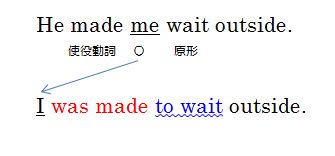
「私は外で待たされた」
能動態では《使役動詞 O 原形》ですが
受動態では《原形》の部分が《to+動詞の原形》になります。

⑧知覚動詞の場合
能動態では《知覚動詞 O 原形》ですが
受動態では《原形》の部分が《to+動詞の原形》になります。

問1
次の英文の空所に入れるのに最も適切な語句を下の①~④から一つずつ選びなさい
1. Spanish ( ) in Mexico.
①is speaking ②is spoken
③speaks ④spoken
2. Mt. Fuji ( ) from here.
①is can
③can seen ④can be seen
3. This singer ( ) by many people all over the country.
①has loved ②has been loved
③has been loving ④loved
4.A big tower ( ) on this island.
①is being constructing ②is being constructed
③is constructing ④has been constructing
5. They ( ) his presentation.
①satisfy with ②are satisfied with
③are satisfied to ④satisfy
6. He was known ( ) all the people in town.
①by ②to ③with ④at
7. Sally was never heard ( ) ill of others.
①speak ②spoken
③of speaking ④to speak
8. Tim was made ( ) late by his boss yesterday.
①to work ②to be worked
③work ④ be worked
9. I was told ( ) outside.
①to wait ②waiting
③to
10. Bill ( ) for an hour at the airport.
①kept to
③was kept to wait ④was kept waiting

問1【解答&解説】
1. Spanish ( ) in Mexico.
①is speaking ②is spoken
③speaks ④spoken
訳:メキシコではスペイン語が話されます。
2. Mt. Fuji ( ) from here.
①is can
③can seen ④can be seen
訳:ここから富士山が見られることができます。
助動詞と一緒に使われているパターンです。
〖助動詞+be+過去分詞〗が正解。

3. This singer ( ) by many people all over the country.
①has loved ②has been loved
③has been loving ④loved
訳:この歌手は国中で多くの人々に愛されてきました。
完了形です。〖have/has+been+過去分詞〗が正解。
③has been lovingだと「歌手が愛してきた」になるので間違い。

4.A big tower ( ) on this island.
①is being constructing ②is being constructed
③is constructing ④has been constructing
訳:大きなタワーがこの島で建設されています。
進行形なので〖be動詞+being+過去分詞〗が正解。
③だと「タワーが(何かを)建設中」
④だと「タワーが(何かを)建設してきた」になるので間違い。

5. They ( ) his presentation.
①satisfy with ②are satisfied with
③are satisfied to ④satisfy
訳:彼らは彼のプレゼンに満足している。
be satisfied with ~「~に満足している」という意味。
byを使いません。

6. He was known ( ) all the people in town.
①by ②to ③with ④at
訳:彼は町の皆に知られていた。
be known to ~「~に知られる」という意味。
byを使いません。

7. Sally was never heard ( ) ill of others.
①speak ②spoken
③of speaking ④to speak
訳:サリーは他人の悪口を言うのを聞かれたことがない。
(=サリーは他人の悪口を言わない)
知覚動詞が使われています。
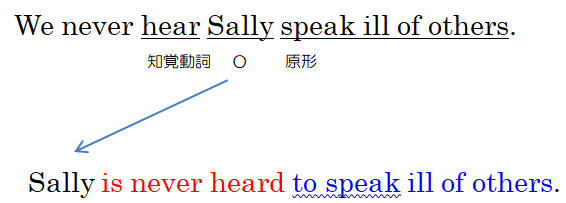
能動態では《知覚動詞 O 原形》ですが
受動態では《原形》の部分が《to+動詞の原形》になります。

8. Tim was made ( ) late by his boss yesterday.
①to work ②to be worked
③work ④ be worked
訳:ティムは昨日上司に残業させられた。
使役動詞makeが使われています。

能動態では《使役動詞 O 原形》ですが
受動態では《原形》の部分が《to+動詞の原形》になります。

9. I was told ( ) outside.
①to wait ②waiting
③to
訳:私は外で待つように言われた。
tell O+動詞の原形「Oに~するように言う」の受動態です。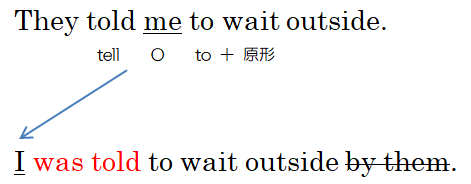
tellの部分をbe動詞+過去分詞にすればOK。

10. Bill ( ) for an hour at the airport.
①kept to wait ②was waited
③was kept
訳:ビルは空港で一時間待たされた。
keep O C「O=Cの状態に保つ」という第5文型の受動態です。


問2
次の各文を( )内の指示に従って書き換えなさい。
1. Everybody laughed at John.(受動態の文に)
2. You can rely on him.(受動態の文に)
3. They speak many different languages in India.(受動態の文に)
4. They are painting the bridge now.(受動態の文に)
5. Erin made me go to the store.(受動態の文に)
6. You must not leave the door open.(受動態の文に)
7. You have to throw away the meat.(受動態の文に)
8. His weakness was taken advantage of by everybody.(日本語に)
9. 彼女は電車で外国人に話しかけられた。(Sheを主語にして英語に)
10. 彼は素晴らしい詩人であると言われています。(HeとItを主語にした2つの英文に)

問2【解答&解説】
1. Everybody laughed at John.
→John was laughed at by everybody.
訳:ジョンはみんなに笑われた。
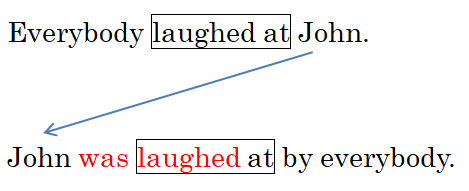
laugh at O「Oを笑う」という句動詞。
受動態になってもlaugh atのかたまりはそのまま。

2. You can rely on him.
→He can be relied on.
訳:彼は頼りにされることができる。
=彼は頼りになる。
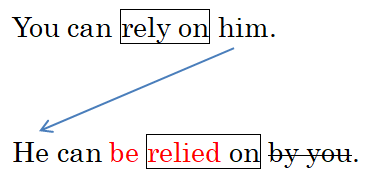
rely on O「Oを頼る」という句動詞。
受動態になってもrely onのかたまりはそのまま。
by youは別に言う必要ないので消す。

3. They speak many different languages in India.
→Many different languages are spoken in India.
訳:多くの異なる言語がインドで話されている。
by ~は言う必要ないので消す。

4. They are painting the bridge now.
訳:橋は今塗装されている。
進行形なので〖be動詞+being+過去分詞〗。

5. Erin made me go to the store.
→ I was made to go to the store by Erin.
訳:私はエリンに店に行かされた。
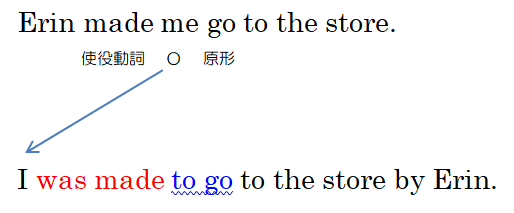
能動態では《使役動詞 O 原形》ですが
受動態では《原形》の部分が《to+動詞の原形》になります。

6. You must not leave the door open.
訳:ドアは開けたままにされてはいけない。
〖助動詞+be+過去分詞〗

7. You have to throw away the meat.
→The meat has to be thrown away.
訳:肉は処分されなければならない。
〖have to+be+過去分詞〗「~されなければならない」

8. His weakness was taken advantage of by everybody.
→彼の弱さはみんなに利用された。

take advantage of O「Oを利用する」という句動詞。
受動態になってもそのかたまりのまま。

9. 彼女は電車で外国人に話しかけられた。
→She was spoken to by a foreigner on (/in) the train.

speak to O「Oに話しかける」という句動詞。
受動態になってもそのかたまりのまま。

10. 彼は素晴らしい詩人であると言われています。
この文は、「彼は素晴らしい詩人であるということが言われています」と読み換えることができます。主語は「彼は素晴らしい詩人であるということ」ですが、長すぎるの仮主語のItに置き換えます。
これで、Itを主語にした解答ができあがり。
→It is said that he is a great poet.
そしてthat節の中のheを主語にすることもできます。こんな風に⇩

その時that節にあった動詞がto+動詞の原形になります。
→He is said to be a wonderful (/greatなど) poet.
こちらで詳しく解説しています。

問3
次の日本語に合うように( )内の語を並べ替えなさい。
1. 私は大きな音で起こされた。
(a / was / noise / by / up / woken / I / loud ).
2. この昆虫は英語で何と言いますか。
( this / what / English / called / insect / in / is)?
3. 私たちは将来コンピューターに働かされるかもしれない。
(computers / may / in / to / we / be / to / work / made / by )the future
4. これは、注目すべきもうひとつの問題である。
This is ( to / attention / another issue/ paid / which / be / needs )

問3【解答&解説】
1. 私は大きな音で起こされた。
I was woken up by a loud noise.
wake up O「Oを起こす」という句動詞。
受動態になってもそのかたまりのまま。

2. この昆虫は英語で何と言いますか。
What is this insect called in English?
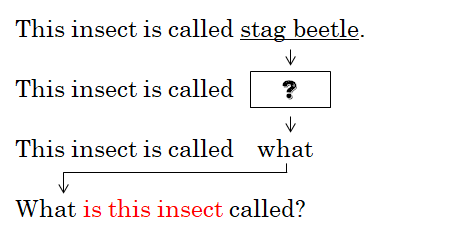

3. 私たちは将来コンピューターに働かされるかもしれない。
We may be made to work by a computer in the future.

能動態では《使役動詞 O 原形》ですが
受動態では《原形》の部分が《to+動詞の原形》になります。
4. これは、注目すべきもうひとつの問題である。
This is another issue which needs to be paid attention to.

この文はwhich以降の下線部が目の前のissueという名詞を修飾しています。
そして、pay attention to O「Oに注目する」という句動詞なので、受動態になってもそのかたまりのままです。

問4
次の英文の中から誤っているものを3つ選びなさい。
①I had my watch stolen.
②I was stolen my watch.
③My watch was stolen.
④The weather is expected to improve today.
⑤My cousin
⑥I was caught in a shower on the way home.
⑦He was surprised

問4【解答&解説】
間違っているもの:②⑤⑦
①I had my watch stolen.
「O=Cの状態にされる」という使役を使った文です。
「私は財布=盗まれた状態にされた」という意味。
こちらで詳しく解説しています。

②I was stolen my watch.
日本語にしたら「私は盗まれた」でOKですが、英語では間違いです。
これだと私という人間が盗まれたという意味になります。盗まれたのは私の財布なので、間違いです。

③My watch was stolen.
「私の財布が盗まれた」これはOK。
④The weather is expected to improve today.
この文は、「天気が今日よくなるということが期待されます」と読み換えることができます。主語は「天気が今日よくなるということ」ですが、長すぎるの仮主語のItに置き換えます。

that節の中のthe weatherを主語にすることもできます。
その時that節にあった動詞がto+動詞の原形になります。

⑤My cousin
dieという動詞は「死ぬ」という自動詞(Oを必要としない動詞)です。
She died him.とは言わないですよね?
S V O
受動態とは、能動態では目的語(O)だったものを主語にした文なので、Oのない自動詞はそもそも受動態にできません。
⑥I was caught in a shower on the way home.
be caught in ~「~にあう、つかまる」
例:I was caught in a terrible traffic jam.
「ひどい渋滞につかまった」

⑦He was surprised
be surprised at ~「~に驚く」
⑧This desk was made of wood.
be made of ~「~でできている」
made ofは見た目で明らかに材料が分かる場合、素材のままの場合。
be made from ~「~からできている」
made fromは素材が変化している場合、形が変わっている場合(液体が個体になど)。
例:Wine is made from grapes.
詳しくはこちらで解説しています。
